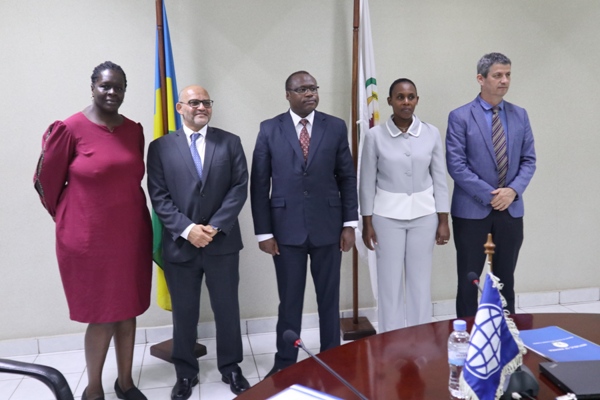
Kigali: The Government of Rwanda and the World Bank today signed a US$125 million (approximately Frw 112 billion) credit agreement to enable fiscally sustainable expansion of electricity services in Rwanda. Uzziel Ndagijimana, Rwanda’s Minister of Finance and Economic Planning and Yasser El-Gammal, the World Bank Country Manager, signed on behalf of their respective institutions.
The new Rwanda Energy Development Policy Operation (DPO) is the third and last in a $375 million programmatic series, the first of which was approved in December 2017. The series support Rwanda’s energy sector objectives under the National Strategy for Transformation (NST1) – including universal access to electricity by 2024 while balancing the trade-offs with fiscal and financial sustainability. This DPO will build on achievements of the previous development Policy Operations.
Speaking at the Signing, the Minister of Finance and Economic Planning Dr. Uzziel Ndagijimana said: “The support through Development Series Operation has significantly contributed to implementation of energy sector development strategy in Rwanda with the aim of having 100% electricity access by 2024 as stipulated in our National Strategy for Transformation”.
“The previous Development Policy Operation series have already delivered substantial results. So far, new connections completed per year have doubled, while total access increased from 41 percent in late 2017 to over 52 percent today, and over a million people have gained access to electricity. This puts Rwanda on the forefront globally of achieving SDG7 of universal access to electricity,” Said Yasser El-Gammal, World Bank Country Manager for Rwanda.
By end-2020, at the end of the DPO series, it is expected that Rwanda will have electrified 61 percent of its households, narrowed the gap in electricity access between female- and male-headed households, and be on track to achieve the National Strategy for Transformation objective of universal access to electricity by 2024. It is also expected that Rwanda will have modernized the operations of the Rwanda Energy Group and the Government’s planning and decision making processes, and that fiscal transfers to the sector be contained at no more than 1.5 percent of GDP throughout the NST1 period.
The World Bank cooperates with Rwanda in sectors such as Agriculture, Energy, Social Protection, Education/Skills development, Transport, Urban resettlement, Urban development and Housing among others alongside other cross-cutting and regional projects interventions. (End)
